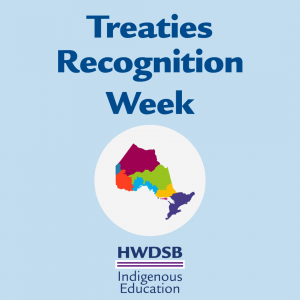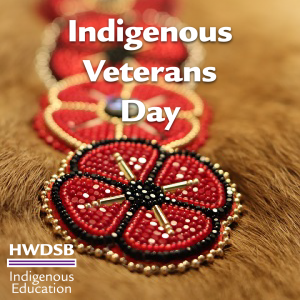
Treaties Recognition Week, Indigenous Veterans Day and Rock Your Mocs – November 2023
Walking Together: Our Journey Continues
| Education | Treaties Recognition Week (November 5 to 11, 2023) |
| Commemoration | Indigenous Veterans Day (November 8, 2023) |
| Celebration | Rock Your Mocs (November 15, 2023) |
At HWDSB, we continue our journey of reconciliation, grounded in peace, friendship and respect, while working alongside the Indigenous Education Circle (IEC), Indigenous Education Department (IED) and the Indigenous community, to honour Indigenous Peoples and give thanks for the land that they continue to share.
November marks three steps on this journey: we welcome and recognize Treaties Recognition Week (November 5 to 11), as well as Indigenous Veterans Day (November 8) and a contemporary celebration, Rock Your Mocs (November 15). Below is a message created with the Indigenous Education Department, in the spirit of fostering positive relationships with Indigenous communities.
Flags at all HWDSB schools and building will be lowered on November 8 for Indigenous Veterans Day.
Treaties Recognition Week: November 5 to 11, 2023
 In 2018, the Ministry of Indigenous Relations and Reconciliation (MIRR) announced that Ontario has designated the first full week of November as Treaties Recognition Week.
In 2018, the Ministry of Indigenous Relations and Reconciliation (MIRR) announced that Ontario has designated the first full week of November as Treaties Recognition Week.
The MIRR Treaty Awareness campaign is an opportunity for Indigenous Peoples and treaty partners to teach and learn about the historic agreements, that were meant to be the foundation for the ongoing relationships.
A treaty is a legally binding nation-to-nation agreement – for example, Indigenous Nations and Crown – that sets out the rights, responsibilities and relationships between the Indigenous Nations of these lands, and the federal and provincial governments on behalf of the Crown.
Treaties can only be made between nations and Indigenous nations to continue to practice the five pillars of nationhood criteria/status, which include: language, distinct culture, way of practicing a common belief system (ceremony), sovereign form of governance and ancestral relationship to land/territory.
Treaty agreements between Indigenous Nations and the Crown were based on eternal peace, friendship and respect.
As Indigenous Peoples and Canadians, we are all treaty people. We have a shared responsibility to learn about a complex history that will inform today’s relationships. Learning about the history of treaties and their original intent helps everyone to identify those parts of the relationships that require attention for healing and restoration.
Many treaties were broken, ignored, and displaced by colonial legislation that include but are not limited to the Indian Act, the imposition of provincial hunting and fishing laws that impacted ancient practices for self-sufficiency. The treaties were made in agreement as partners, but the legislation predicated the genocide that was revealed in the 2015 Truth and Reconciliation Final Report by Justice Murray Sinclair.
The Indigenous Education Department (IED) within HWDSB acknowledges that the implementation of Treaties Recognition Week lessons and activities is a crucial step toward emphasizing the often- overlooked truth, in Truth and Reconciliation (see Education for Reconciliation, Calls to Action #62-65).
We anticipate educators will engage with our tool for maintaining proficiency in Indigenous Education. We call them the 3 As; accuracy, authenticity and accountability to both the Indigenous and treaty partner community.
This can be a difficult part of this journey. What can be more humbling, is the self-efficacy that we engage in when we learn the truths and realities of how the Crown directly impacted Indigenous communities by not honouring the treaties and agreements. We have the opportunity to correct the perspective that many of us were taught from. We have a responsibility to unlearn the distorted truths that we were taught and relearn and reaffirm the treaties in an honest and reconciliatory way.
Indigenous Veterans Day: November 8, 2023
 We honour and celebrate our Warriors who continued their duty to protect our villages. When great conflict arose overseas, they answered the call as allies.
We honour and celebrate our Warriors who continued their duty to protect our villages. When great conflict arose overseas, they answered the call as allies.
Indigenous peoples never surrendered nationhood sovereignty and therefore, were not recognized as Canadian citizens during World War I and World War ll, and served as allies of the Crown. This means that they could not be conscripted (drafted) to serve. Every Indigenous soldier that served in both Great Wars, volunteered.
Many were enfranchised as a result, meaning that they were stripped of their legal right to be registered as a status Indian. These veterans could not return to their home communities to live as they were no longer band members.
Others, who maintained their Indian status, were not legally eligible to purchase and/or own (off-reserve) land. It was illegal for status Indians, including veterans, to purchase the lands that they fought to protect.
If they attempted to purchase land, the authorities were called to inform them of the consequences, which included jail (Forgotten Warriors by Loretta Todd – NFB).
Lands such as Ipperwash that were ‘borrowed’ for military purposes under the War Measures Act, to date, have not been returned to the host Nations.
We remember Indigenous Veterans, Warriors who served during the American Revolution, the War of 1812, World War l, World War ll. Many Indigenous soldiers volunteered on either side of the imposed border (Jay Treaty). We also acknowledge that many served during other conflicts including Iraq, Korea, Vietnam and Afghanistan.
Locally, Mississaugas of the Credit holds the distinction in Canada, of being the community who had the highest number of volunteers per capita. Every man who could, served during World War l and World War ll.
Recently, a Six Nations woman received an honour when an elementary school in Brantford was renamed Edith Monture Elementary School. She served in the first World War as a U.S. Army Nurse.
On November 8, 2023, please take the time to honour and remember Indigenous veterans, families, communities and nations. The only way that we can truly engage in reconciliatory practice, is to learn the truth, then we know what we are reconciling.
- Honouring Indigenous Veterans
- Indigenous Veterans, Veterans Affairs Canada
- History, Veterans Affairs Canada
Rock Your Mocs Day: November 15, 2023
Moccasins
Watahkwah’ón:we (Kanyen’kehá:ka – Mohawk translation)
Makazinan (Anishinaabemowin – Ojibway translation)
Rock Your Mocs emerged out of a social movement among Indigenous nations from our southern relatives as an opportunity to celebrate the protection and resurgence of our distinct and diverse Indigenous cultures. We are still here. We will always be here.
Rock Your Mocs is a virtual intertribal – meaning it welcomes members of all nations to wear Makazinan/Watahkwah’ón:we with pride. Participants are invited to take pictures and post to social media with the hashtag, #ROCKYOURMOCS.
We understand that there are concerns about cultural appropriation. If treaty partners choose to wear their moccasins, we encourage educators and parents to have conversations about cultural appropriation vs. cultural appreciation in their classrooms and at home; we emphasize eternal peace, friendship and respect.
We invite everyone to wear a turquoise ribbon (robin egg blue) to represent the strength in unity that we celebrate across Turtle Island.
The Moccasins that we wear on our feet tells a story of how we still walk gently on Mother Earth, how our Ancestors still guide us, and how we always have and always will, belong to the Earth.
We encourage Indigenous Peoples and treaty partners to consider how we will walk forward and continue our journey towards Reconciliation and Restorative Indigenous Educational Wellness.
Our Journey Continues,
Indigenous Education Department
Updated on Tuesday, November 07, 2023.

